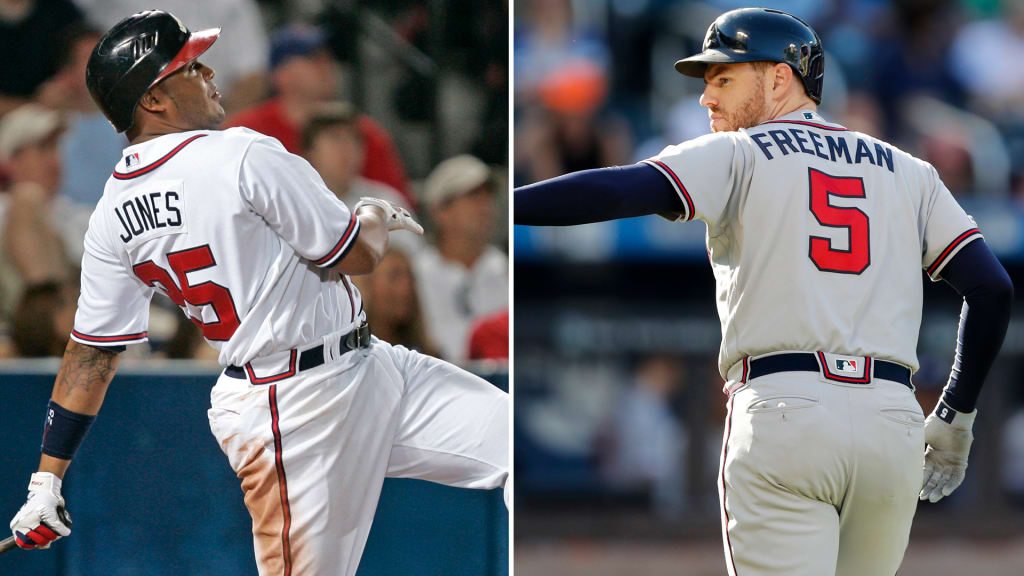
ATLANTA -- When looking at how productive Freddie Freeman would need to be to one day have his number retired by the Braves, it’s easy to see why many fans believe Andruw Jones should have already been bestowed this honor.
Dale Murphy (3), Bobby Cox (6), Chipper Jones (10), Warren Spahn (21), John Smoltz (29), Greg Maddux (31), Phil Niekro (35), Eddie Mathews (41), Hank Aaron (44) and Tom Glavine (47) are the Braves to have had their number retired.
The Braves do not have set requirements in place for a player to draw consideration for this esteemed honor. Nine of the 10 men are enshrined in the National Baseball Hall of Fame. But though Cooperstown’s doors have not yet opened for Murphy, his iconic stature undoubtedly made him worthy to have his number eternally honored alongside the franchise’s other greats.
Time will tell whether a Hall of Fame selection stands in the future for Andruw Jones, whose balloting results improved this year, or Freeman, who has many more years to build his resume. But they already sit at the front of any discussion regarding who might be the next to have his number retired by the Braves.
Before arguing Jones’ case and projecting Freeman’s potential case, let’s glance at the franchise’s all-time bWAR (Baseball-Reference Wins Above Replacement) leaders: Aaron (142.6), Mathews (94.1), Spahn (91.9), Niekro (89.6), Chipper Jones (85.3), Smoltz (66.9), Maddux (66.2), Andruw Jones (61.0), Glavine (58.6) and Murphy (47.3).
Regarded as one of the best defensive outfielders in baseball history, Jones won 10 Gold Glove Awards and was part of 10 postseason teams during his 12-season stint with the Braves. His bWAR ranks fourth in franchise history among position players and is nearly 14 points higher than the one produced by Murphy, who played 165 more games than Jones with the Braves.
Now that we’ve reached the “if Murphy, why not Andruw?” segment of this argument, let’s look at some of the offensive stats they produced for the Braves.
Murphy: .268 batting average, 371 home runs, .829 OPS, 125 OPS+
A. Jones: .263 batting average, 368 home runs, .839 OPS, 113 OPS+
While most of these numbers are quite similar, the park- and league-adjusted component of OPS+ indicates Murphy was the more productive offensive player. Of the 28 players who have played at least 1,000 games for the Braves, Murphy’s OPS+ ranks eighth and Jones’ ranks 13th, just behind Brian McCann (115) and Javy Lopez (114).
But even with the strong memories created by his two homers in the 1996 World Series and the franchise-record 51 homers he hit in 2005, Jones’ résumé will always be highlighted by what he did with his glove.
Jones led all Major Leaguers with a 26.7 Defensive bWAR during his 11 full seasons (1997-2007) with the Braves. Ivan Rodriguez ranked second with 16.5. The 60.9 bWAR Jones produced during this 11-season span ranked third in the Majors, behind Alex Rodriguez (85.7) and Barry Bonds (79.2). Chipper Jones ranked fourth at 60.9.
Andruw Jones’ decline after leaving the Braves has weakened his bid to be enshrined in Cooperstown. But the possibility of his No. 25 being retired is strengthened every time you look back at the tremendous success he had while becoming a fan favorite in Atlanta.
If Jones is not the next former player to have his number retired by the Braves, the next candidate might be Freeman, who is hoping to sign a long-term extension when his current deal expires after the 2021 season.
Freeman will need to be highly productive for at least five more seasons to even warrant consideration for this lofty honor. But if the 30-year-old first baseman finishes his career as successfully as his good friend Chipper Jones did, then there will come a time when we’re seriously talking about the possibility of the Braves retiring his No. 5.
Here are the top five bWAR totals produced by a Braves player through his age-29 season: Aaron (73.9), Mathews (67.8), Andruw Jones (58.0), Chipper Jones (38.6) and Freeman (35.7).
Freeman was 21 when he became the Braves’ first baseman, while a knee injury forced Chipper Jones to wait until he was 23 before becoming a mainstay in Atlanta’s lineup. But it’s still worth noting how similar this number was through their respective age-29 sesaons.
The 46.7 bWAR that Chipper Jones produced over the 11 seasons he played at 30 or older ranks 25th all-time among position players. If Freeman is going to come close to maintaining that level over the final decade of his career, he will need to remain healthier than he has been the last few years.
Freeman’s fractured left wrist cost him six weeks during the 2017 season and zapped some of his power until he hit 38 homers through the first 138 games of last season. Then, he dealt with a right elbow bone spur that significantly burdened him throughout the remainder of the year.
Still, even with the injuries and lingering consequences, Freeman’s 20.7 bWAR since the start of 2016 ranks fourth in the National League, trailing only Nolan Arenado (25.0), Christian Yelich (22.9) and Anthony Rendon (21.7).
Freeman’s average bWAR over the past four years is 5.2. If he were to maintain that pace over the next five seasons, his career bWAR would be 61.7. This would be a tick higher than the 61.0 bWAR Andruw Jones produced with the Braves.
If looking for a larger sample size, Freeman has produced a 35.8 bWAR dating back to his rookie season in 2011. This equates to an average of 4.0 over the past nine seasons. If he were to maintain that pace over the next six seasons, he’d once again have a total nearly equal to Andruw Jones.
But while it might now be fun to project how impressive Freeman’s credentials could be, we know how hard it is to predict how a player will fare after turning 30.
If Freeman were to experience a decline similar to the ones experienced by Andruw Jones and Murphy, he might only be considered one of the Braves’ greats. But if he were to continue thriving like Chipper Jones, then possibly having his number retired will not be the only hallowed honor he’ll receive after retiring.



